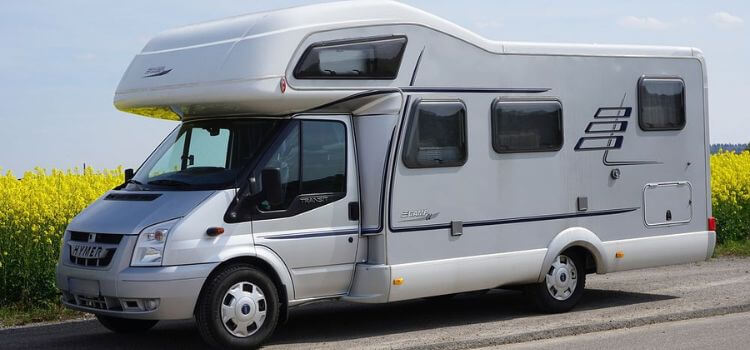As an Amazon Associate, I earn from qualifying purchases
A camper can weigh anywhere from 2,300 pounds for a pop-up camper, up to 7,600 pounds for a toy hauler, depending on its size and type. The weight of a camper is an important consideration when towing or carrying it, as it can impact the performance and safety of your vehicle.
It’s essential to know the weight of your camper to ensure that you are within the towing capacity of your vehicle and to properly distribute the weight for stability on the road. In this article, we will deeply discuss How Much Does a Camper Weigh? Let’s start by understanding the importance, factors and determination of How Much Does a Camper Weigh?
Understanding Camper Weight

When it comes to owning a camper, understanding its weight is crucial for a variety of reasons. From ensuring safe towing and preventing issues with your vehicle to complying with road regulations, knowing how much your camper weighs is essential. In this section, we will explore the importance of knowing camper weight, the factors that affect it, and how to determine it accurately.
Importance Of Knowing Camper Weight
Knowing the weight of your camper is important for several reasons:
- Safe Towing: Towing a camper that exceeds your vehicle’s towing capacity can put you and others on the road at significant risk. By understanding the weight of your camper, you can ensure that your vehicle is capable of safely towing it.
- Road Regulations: Different regions have specific regulations and restrictions regarding the weight of campers and towing vehicles. By knowing your camper’s weight, you can ensure compliance with these regulations and avoid potential fines or legal issues.
- Prevent Vehicle Damage: Overloading your vehicle’s towing capacity with a heavy camper can cause damage to its engine, transmission, suspension, and brakes. By adhering to the recommended weight limits, you can prevent costly repairs and maintain the longevity of your vehicle.
Factors Affecting Camper Weight
The weight of a camper is influenced by various factors:
- Size and Type: Different types of campers, such as travel trailers, pop-up campers, and fifth wheels, have distinct weight ranges. Additionally, the size and construction materials of the camper play a significant role in determining its weight.
- Features and Amenities: Campers equipped with additional features and amenities, such as larger water tanks, kitchen appliances, and slide-outs, tend to weigh more due to the added weight of these components.
- Payload and Cargo: The weight of personal belongings, camping gear, food, and water supplies that you plan to carry in the camper will also contribute to its overall weight.
How To Determine Camper Weight
To accurately determine the weight of your camper, follow these steps:
- Weighing Stations: Utilize public weighing stations specifically designated for RVs and trailers. These facilities have larger scales that can accommodate the size and weight of campers. Simply drive your camper onto the scale and record the weight. Be sure to measure the weight with all your belongings and supplies inside the camper.
- Manufacturer Specifications: The manufacturer’s specifications provide valuable information about the empty weight, Gross Vehicle Weight Rating (GVWR), and carrying capacity of your camper. These specifications are usually listed in the owner’s manual or can be obtained from the manufacturer’s website.
- Weight Distribution Hitch: If you already own a weight distribution hitch, you can use it to determine the tongue weight of your camper. Tongue weight refers to the downward force exerted on the hitch by the front of the camper.
By understanding camper weight and its significance, you can make informed decisions while towing, ensure compliance with regulations, and protect your vehicle from unnecessary damage. Remember to always refer to the manufacturer’s specifications and utilize appropriate weighing stations for accurate measurements.
Average Camper Weights By Type

When planning a camping trip, it’s important to know how much your camper weighs. Understanding the weight of your camper is crucial for safety reasons, as well as for ensuring that you have the right towing capacity. In this section, we’ll explore the average weights of different types of campers, including pop-up campers, small travel trailers, large travel trailers, and toy haulers.
Pop Up Campers
Pop-up campers are a popular choice for those looking for a versatile and lightweight camping option. These campers typically have a soft-sided section that can be raised or lowered for travel and camping. On average, pop-up campers weigh around 2,300 pounds empty. This weight can vary depending on the specific model and features.
Small Travel Trailers
If you’re looking for a camper that offers more amenities and comfort, but is still lightweight, small travel trailers are a great option. These campers are compact and are designed to be towed by smaller vehicles. On average, small travel trailers weigh around 2,800 pounds empty. It’s important to note that this weight can increase significantly when the trailer is fully loaded with gear and supplies.
Large Travel Trailers
For those who prefer more space and amenities, large travel trailers are a popular choice. These campers offer all the comforts of home, including kitchens, bathrooms, and sleeping areas. On average, large travel trailers weigh around 6,700 pounds empty. However, it’s important to consider the additional weight that comes with fully loading the trailer, including food, water, and personal belongings.
Toy Haulers
Toy haulers are a unique type of camper that combines living space with a separate area for storing recreational vehicles such as ATVs, motorcycles, or bicycles. These campers are designed to accommodate both living and storage needs. On average, toy haulers weigh around 7,600 pounds empty. Keep in mind that the weight can increase significantly when loaded with vehicles and gear.
It’s essential to keep these average camper weights in mind when planning your next camping trip. Understanding the weight of your camper is key to ensuring that you have the appropriate towing capacity and can safely enjoy your outdoor adventure. Remember to consider the weight of your personal belongings, supplies, and gear when estimating the total weight of your camper.
Camper Weight Chart
| Camper Type | Weight Range (lbs) |
| Popup Camper | 1,200 – 3,000 |
| Travel Trailer | 2,500 – 9,000 |
| Fifth Wheel Trailer | 7,000 – 15,000 |
| Truck Camper | 1,000 – 4,000 |
| Teardrop Trailer | 500 – 3,000 |
| Class B Motorhome | 6,000 – 11,000 |
| Class C Motorhome | 10,000 – 14,000 |
| Class A Motorhome | 13,000 – 30,000 |
Considerations For Camper Weight

When considering the weight of a camper, there are various factors to keep in mind. The size and type of camper will determine the average weight, with pop-up campers typically weighing around 2,300 pounds, small travel trailers at 2,800 pounds, large travel trailers at 6,700 pounds, and toy haulers at 7,600 pounds.
Understanding the camper’s weight is essential for safe towing and determining compatibility with your vehicle.
When it comes to purchasing a camper, one important factor to consider is its weight. The weight of a camper plays a crucial role in determining its compatibility with your vehicle and ensuring a safe and smooth journey. Understanding the considerations for camper weight can help you make an informed decision and avoid any potential issues that may arise during travel.
Matching Camper Weight To Vehicle Capability
Before setting off on your camping adventure, it is essential to match the weight of the camper to your vehicle’s capability. It is crucial to consider your vehicle’s tow rating, which is the maximum weight it can safely tow. Exceeding this limit can put undue stress on your vehicle’s engine, transmission, and brakes, potentially leading to mechanical failure or accidents.
To determine your vehicle’s tow rating, refer to the owner’s manual or consult with the manufacturer. It is recommended to choose a camper that falls within 80% of your vehicle’s tow rating to ensure a comfortable and safe towing experience. This allows for a margin of safety and helps prevent strain on your vehicle.
Weight Distribution Hitch
When towing a camper, using a weight distribution hitch can significantly improve stability and control. A weight distribution hitch redistributes the weight from the rear axle of your vehicle to the front axle and the trailer’s axles, ensuring a more balanced load. This helps prevent swaying and improves handling, especially during high-speed or windy conditions.
When selecting a weight distribution hitch, make sure to consider the total weight of your loaded camper, including the gear and supplies inside. Choose a weight distribution hitch that can adequately handle the combined weight of your camper and prevent excessive rear sag or loss of front axle traction.
Gross Vehicle Weight Rating (gvwr)
The Gross Vehicle Weight Rating, also known as GVWR, is the maximum allowable weight of a fully loaded camper, including its cargo, passengers, and fluids. It is essential to know your camper’s GVWR to ensure you do not exceed it, as it may lead to overloaded axles, suspension issues, reduced maneuverability, and increased stopping distances.
To determine your camper’s GVWR, refer to the manufacturer’s documentation or the weight rating label located on the camper itself. It is crucial to understand that the GVWR includes the weight of all the gear, supplies, and water onboard, so keep this in mind when packing for your trip.
Before hitting the road, make sure to weigh your loaded camper at a certified truck scale to ensure it is within the GVWR limits. This will give you peace of mind and help you make any necessary adjustments to stay within the safe weight range.
By considering these factors when determining the weight of your camper, you can ensure a safe and enjoyable camping experience. Matching the camper weight to your vehicle’s capability, using a weight distribution hitch, and understanding your camper’s GVWR will help you avoid potential problems and have a worry-free journey.
Frequently Asked Questions On How Much Does A Camper Weigh
How Much Does A 17 Foot Camper Weigh?
A 17-foot camper typically weighs around 2,800 to 6,700 pounds, depending on the type and size of the camper.
How Heavy Is A 40 Foot Camper?
A 40 foot camper typically weighs around 6,700 pounds.
How Much Does A 32 Ft Travel Trailer Weigh?
A 32 ft travel trailer typically weighs around 7,600 pounds.
How Much Does A 26 Ft Travel Trailer Weigh?
A 26 ft travel trailer typically weighs around 6,700 pounds.
Conclusion
Understanding How Much Does a Camper Weigh is crucial for a smooth and safe camping experience. From small travel trailers to toy haulers, each type has an average weight that you should consider. By referring to camper weight charts and consulting with experts, you can ensure that your vehicle can handle the load and that you have a comfortable journey.
So, before embarking on your next adventure, take the time to determine the weight of your camper and make the necessary preparations. Happy camping!
Read More
1. Best Family Tents For Camping: Your Ultimate Camping Companion
2. Best Large Camping Tents: Experience Ultimate Comfort In The Great Outdoors
3. Best Pop Up Camping Tent For Effortless Outdoor Adventures
4. How to Insulate a Tent for Winter Camping – Top Tips for Cozy and Warm Adventures
As an Amazon Associate, I earn from qualifying purchases


